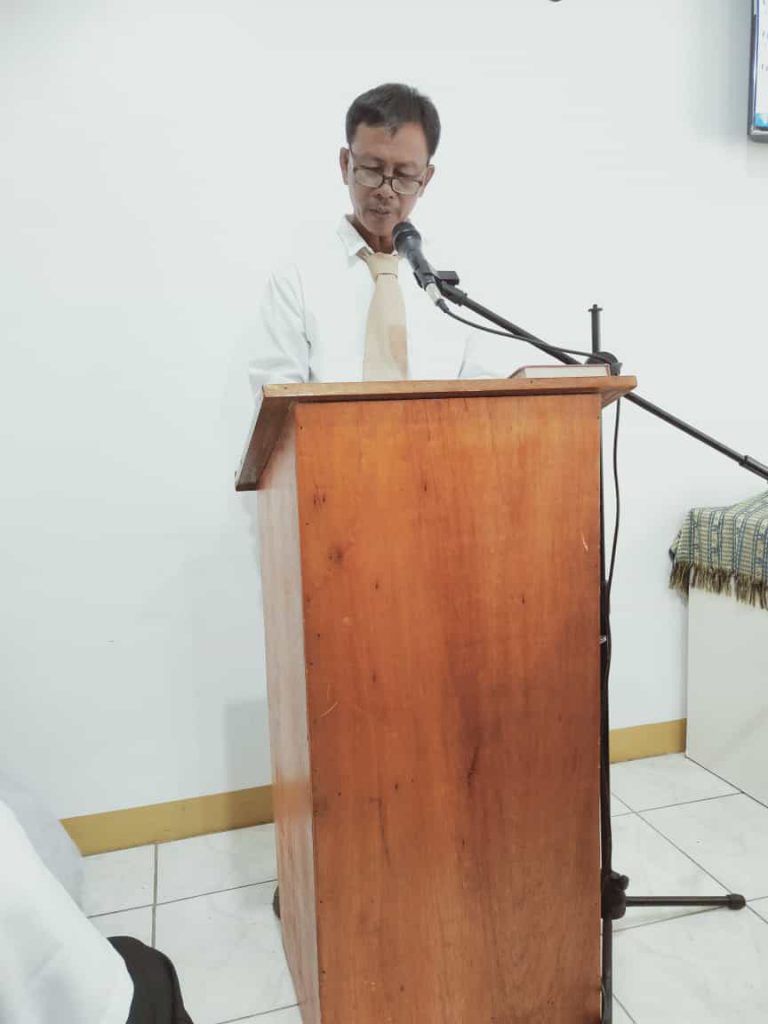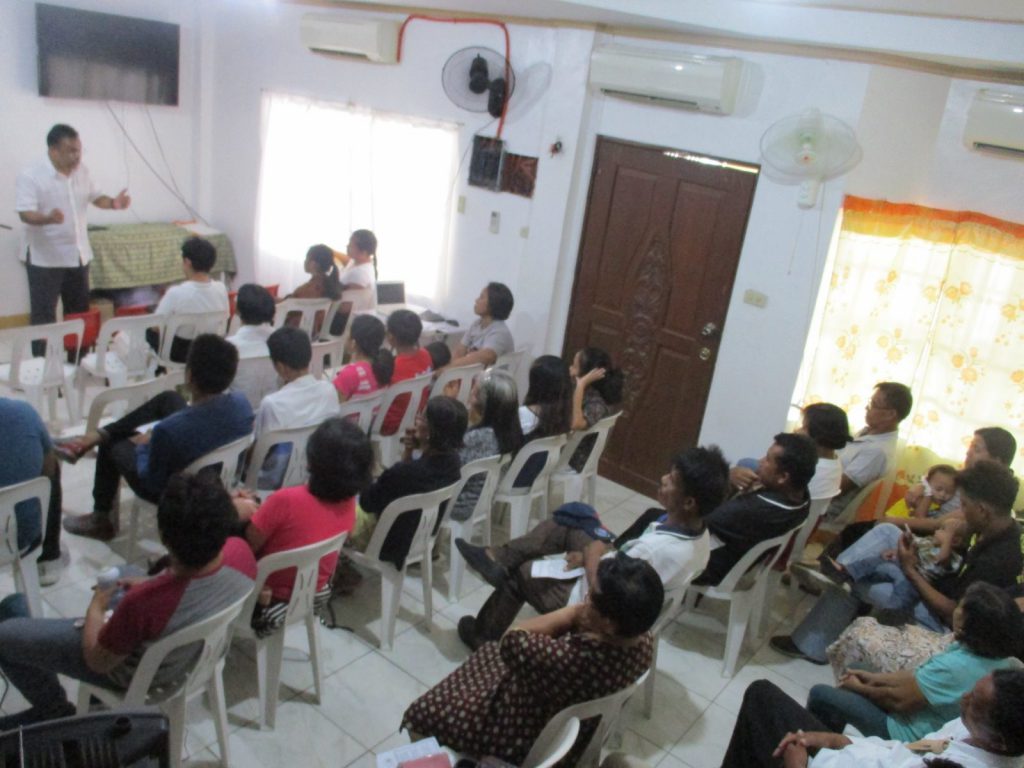(We continue to publish the testimonies of brethren who will be joining the church. May their testimonies bring joy to our hearts and praise to the Lord.)
Sunyani Kurniawan
I still remember the weekly chapel sessions that I attended when I was in Kuo Chuan Presbyterian Primary School. Even though I was still a Buddhist then, I could not help but be drawn by the messages / songs, and even marvelled at the brightly-lit interior of the chapel within the school compound. It was a sharp contrast to the dim, eye-stinging and smoky temple my father took me to back in Jakarta.
It was only years later when my father got to know Christ, that he encouraged all of us to go to church. He had experienced a great sense of peace which he was not able to have from the idols which he had worshipped for over 3 decades. I was not into the idea as I felt that I was a betrayer – wouldn’t that make me a disloyal and disobedient person if I turned my back on these gods? There are many of them; what if I was punished for my "misconduct"? On hindsight, it was undeniably by God’s grace that I went to church.
The first church we went to was a branch of Zion Presbyterian Church. We prayed to the Lord and repented of our sins, placing our faith in the Lord Jesus. We were baptised in the mother church in late 2009. Subsequently, I worshipped in Zion for about 4 years, even after my family members respectively went to different churches. I eventually ended up in Orchard Road Presbyterian Church, as I felt a greater sense of belonging there. I stayed for about 5 years, made many friends and was able to grow spiritually somewhat. As time passed, I felt rather stagnated – and lukewarm in my faith.
To satisfy the thirst to learn more about God and His Word, I decided to get out of my comfort zone and explore other options. It was time for a "new chapter" for me. I searched in Google for "Presbyterian church in the east". As I scrolled, the word ‘Gethsemane’ caught my eyes, and I clicked on the link. I began to listen to the Live Webcast every Sunday, but I yearned for more: communion and interaction with fellow believers. By faith, I went ahead to attend the service and have continued to do so until today.
In retrospect, I am truly thankful that God’s providence had brought me to GBPC, where I am constantly edified, rebuked in gentleness, and enlightened by His Word through the preaching and also through the fellowship with everyone in the church.
Jumar Balicao
Since birth, I’ve always been a follower of Roman Catholicism, blinded by the superstitions / rituals and the belief that only the priest has the right to read the Bible. However, every now and then I attended my aunt’s Christian church (which is charismatic) for the sake of sweets and games. Back then, I did not really know what is the reason for going to church.
In 2014, when one of my colleagues asked me to join them to attend his (charismatic) church, I started to consider Jesus Christ as my Lord and Saviour. I then trusted Him and continually sought to learn God’s Word.
"All is going well," I thought to myself, until I came across Reformed Theology or Calvinism (which I believe was the work of the Holy Spirit). Then I wondered why this truth was not taught or preached in that church. More questions arose which no one in that church answered. A question that my friends and I raised up to the leaders of the church became a big issue – "Why is our pastor a woman?" And their answer was: "Why not?" We pointed out from the Scriptures why it should not be the case, but to no avail. They quoted Romans 8:1 to justify their appointment of women-pastors, though that passage was clearly not referring to the questions we raised about church leadership. They began to call us sexist and such. It was hurtful to see friends denying and hating us. I am always reminded of what Jesus said in John 15:18-19, "If the world hate you, ye know that it hated me before it hated you. If ye were of the world, the world would love his own: but because ye are not of the world, but I have chosen you out of the world, therefore the world hateth you."
Lastly, I thank God that we came to know about Gethsemane BP Church through a member of the church. In his conversation with one of my housemates (a fellow believer who was just as distressed as me about our previous church’s charismatic doctrines and practices), he said, "I don’t believe in the modern tongues-speaking". We then decided to visit the church. Upon attending the church for the past one year, we were convinced that our coming was the work of the Holy Spirit. All glory and praise be to God!
Juffrey Balicao
I praise God for the privilege to write a short testimony on how I came to know our Lord and Saviour Jesus Christ. I came from a Roman Catholic background. In September 2014, I came to Singapore to look for a job and my brother invited me to join him to attend church (which is a charismatic church). In December that year, I received Jesus Christ and was baptised the following year. For 3 years, I was blinded by the carnal and sensual system of that movement. Thank God for helping me realise that their doctrines and teachings are unbiblical, for they promote a prosperity gospel. I praise God for His grace and mercy in opening my spiritual eyes through reading and hearing sermons of reformed pastors.
In end August 2018, I left that church with nowhere to go for worship the next Lord’s Day. Until my brother Rowell shared of someone worshipping in a reformed church. We searched the internet and came across Gethsemane’s website, where we listened to the sermon uploaded on 26th August 2018.
On 2nd September 2018, we came to Gethsemane to join the Filipino Fellowship. Rev. Reggor Galarpe was preaching that day. Our time of fellowship with him was rather short (as they were heading to India for the Bible Witness retreat). During this period, I feared that we were unable to find a biblical church that is preaching the truth. I was also worried that I might find myself comparing different churches, ending up criticising their weakness and using these as excuses to look for a better church. Thank the Lord for keeping and leading us to Gethsemane BP Church, that we may see wondrous things out of God’s law.
Since then, we regularly worship the Lord in Gethsemane. We not only found a church but also a pastor who, by the grace of God, is bold enough to challenge the congregation to follow him as he follows Christ. Truly, the Lord is with him and the elders whom God has called and appointed to lead and watch over His church. God uses His chosen servants, like pastors and elders, to bless, feed and guide His flock. Surely, we are under God’s mighty hand, for our leaders are led by the Spirit of God.
Praise God for His mighty works upon His people. May the ministry of our church flourish and prosper to the glory of His name.
Ignatius Law
From young, I had been brought up in a BP church. I thank God for my mother bringing me constantly to church – firstly, to Maranatha BPC while a toddler; and later, to Moriah BPC in my primary school days. Being a playful and rebellious child, I treated the church premises as a playground instead of a holy sanctuary for worship. Instead of going to Sunday School, I would often play in the church premises. I had little regard for the things of God, being young and foolish. Truly, "the heart is deceitful above all things, and desperately wicked" (Jeremiah 17:9).
As I grew older, with no knowledge of God in my life, I gradually reduced attendance in church during my early teenage years. By the time I was 16 years of age, I had completely drifted away and was lost to the world and its carnal ways. I got into trouble regularly and was a cause of exasperation and frustration to my parents. However, the Lord did not forsake me, but instead opened the way for me to study in Perth despite my mediocre results.
My first "encounter" with BPCWA in March 2017 came about as a result of my intention to purchase a second-hand textbook from another student. Praise the Lord for a brother who approached me and explained the Gospel to me. He then invited me for a "welcome dinner" at BPCWA, which I gratefully accepted. Afterwards, different people would come and talk to me about salvation, heaven and hell, but I only listened with a pinch of salt.
"But God, who is rich in mercy, for his great love wherewith he loved us, even when we were dead in sins, hath quickened us together with Christ" (Ephesians 2:4-5). During the sunrise service on the 16th April 2017, Rev. Joseph Poon preached about Christ’s suffering on the cross and the amount of pain, suffering and humiliation Christ suffered. I started feeling uncomfortable as my conscience was pricked by all that Christ had done for me. That day when I went home, I asked Jesus Christ to be my Lord and my Saviour, and to deliver me from eternal judgment. "I am crucified with Christ: nevertheless I live; yet not I, but Christ liveth in me: and the life which I now live in the flesh I live by the faith of the Son of God, who loved me, and gave himself for me" (Galatians 2:20).
May I constantly depend on God in my life, and continually grow more in grace and in the knowledge of my Lord and Saviour Jesus Christ (cf. 2 Peter 3:18a).
Marcus Chui
I was born into a non-Christian home and attended Anglo-Chinese School (ACS), a Methodist school, for 12 years – from primary school to junior college. Although my education in ACS exposed me to Christian teachings through chapel services and Religious Emphasis Week events, I gave minimal thought to my salvation.
During my upper secondary school years, I was introduced to New Creation Church (NCC) through my relatives. It was during this period that I started developing a deeper interest in reading the Scriptures. Subsequently, I pursued tertiary education overseas; some time during this period (in my early-20s) I was born again, receiving the Gospel and salvation. That marked the start of a tumultuous journey, because as I studied the Scriptures, I could not reconcile with many of NCC’s practices vis-à-vis the Bible. When I returned to Singapore upon completion of my tertiary education, I embarked on a "mission" to seek the truth of the Scriptures. Though still attending NCC at that point of time, I did not feel peace in my heart when I listened to the sermons and when I observed the church’s practices. Thus, I began to question the veracity of NCC’s teachings.
By the grace of God, I was introduced to FEBC and I enrolled in FEBC’s online modules from early 2018. As I studied God’s Word through FEBC, it confirmed what I had long suspected in my heart: that "tongues-speaking", "signs-and-wonders", "faith-healing" and charismatic worship are contrary to God’s Word. Therefore I initiated my departure from NCC, and I thank God that I successfully cut ties with NCC since last year.
Through FEBC, I heard Pastor Koshy’s teachings; I decided to worship in Gethsemane BP Church because I firmly believe that GBPC’s teachings align with God’s Word. I look forward to being baptised and becoming a member of GBPC. Henceforth, I also identify myself as a Bible-Presbyterian. "Truth is always with the minority" – these are the words of Rev. Dr Timothy Tow in The Story of My Bible-Presbyterian Faith (page 38). I concur with this statement. The basis of our faith must always be the Scriptures, and nothing else.
May God help me to maintain my testimony, set me apart from worldliness in all my ways. May God guide me always in my pilgrimage until He calls me home.
Karina Leong
I first came to know of the Lord Jesus in Primary 6 when my cousin, who was worshipping at Calvary Tengah BPC then, invited me to their YF camp. However, I only came to accept Christ as my Saviour in Secondary 2 when I was experiencing some difficult times in school and at home. Church had become a haven for me as it was where I felt comfort and joy. I said the sinners’ prayer after I realised that I needed the Lord as my Comforter and Saviour. That was the year I also stopped hanging out with the people in school who had been influencing me to sin.
The church later suffered a split when I was in Secondary 3, and I followed my friend to Gethsemane BPC, which is near my house. After a while, I realised that I was growing spiritually much more in Gethsemane than when I was in Tengah. The key factors are my increase in Scriptural understanding and talking about spiritual things with like-minded Christians. I liked Pastor Koshy’s way of preaching which enables me to better understand his sermons. Moreover, the warm fellowship of church members in Gethsemane also makes me at home.
Thank God for leading me to Gethsemane, where I can grow spiritually through Pastor’s preaching and encouragement from God’s people.
Nikko Paroan Sario
I’m from Lucban province of Quezon, Philippines. I grew up in a Roman Catholic family, a typical Roman Catholic boy who went to church only for special occasions like birthday, or Christmas, or when I had something to pray.
In May 2018, I came to Singapore to work and a good friend of mine invited me to his church. At their fellowship meeting in June, I heard for the first time about Jesus Christ, of what He did to save us from our sins. Two days later, at my first Sunday Service in that church, I repented of my sins and accepted Jesus Christ as my Lord and Saviour. I continued joining my friend in that church – until one day, our group raised a few concerns. One of these was on tongues-speaking, which the church leaders were unable to provide a good and acceptable answer. This led us to leave and look for a Bible-believing church that can teach us the Truth.
When I first came to Gethsemane BP Church, I felt awkward because it is very different from my previous church, in terms of worship, prayer and teachings. But as I stayed on, I felt a sense of peace / assurance when listening to the faithful preaching of God’s Word by Pastor Koshy and the preachers. Even though most of the preaching provoked and rebuked me, it is okay because I know that God’s Word will help me pursue His kingdom. Now I am so blessed to be in GBPC, because I know this is God’s will for me.
Rhovie Kyt Bince
I was raised by my Roman Catholic parents. As a child residing in Manila, we attended mass every Friday in Quiapo Church, which is well-known for the "Black Nazarene". Our family moved to Pangasinan (when I was 8 years old), where we spent our Sundays in Our Lady of Manaoag Church, known for its massive number of devotees. I was exposed to the doctrines and sacraments of the Catholic church until I graduated from the University at the end of 2015.
All these, however, did not make me any holier. I was a person who shows excessive pride. I was full of my own self, a smoker, a heavy drinker, a gambler and a constant trouble to my family and others.
In May 2016, I came to know about Hope Church in Singapore, and visited the church with my girlfriend. I attended the Life group. During this period, I accepted Jesus as my personal Lord and Saviour. As I started to read and study the Scriptures, I started to discern the charismatic errors within the church, being led by the Holy Spirit. I was among a group of Filipinos there who trusting in His mercy and grace decided to leave the church. By God’s providential leading, we found GBPC and heard the pastor’s sermons in Youtube, subsequently attending my first GBPC’s worship service on 2nd September, 2018.
I praise God for protecting and preserving me and my fellow brethren, and leading us to GBPC, a church with a leadership that have the marks of Jesus Christ and preach the Scriptures faithfully.
Koh Kian Ann
I came to know about the Lord Jesus when my daughter Yan Ling fell sick last August. At that time, my wife and I were lost and helpless. We sought for advice and help from my former army friend, Brother Ricky Yang, and his wife, Sister Stella. We hoped for divine help even though we had not believed in Jesus.
Through Ricky and Stella, we came to know about Gethsemane BP Church. We started to attend Sunday service since last August, and got to know Pastor Koshy and Preacher Daniel Lim. All of them had given us the support and help during our tough time through visitations, prayers and God’s Word. So, we decided to worship in Gethsemane.
After we came to believe in Jesus as our Lord and Saviour, our lives have become more peaceful and joyful. Praise and glory to the Lord!
Huang Li Hui
Before becoming a Christian, I was very lost and had a very negative outlook on life. When I faced difficulties and challenges, I would spend a lot of my time and efforts to try to resolve the challenges, but it all proved futile.
In July 2018, my family faced a crisis. We were so helpless and full of despair. So we asked our family friends, Brother Ricky and his wife Stella for advice and help. Through their strong support, encouragement, patience, love and care, we felt God’s love and grace. Then my husband and I started to follow them to Gethsemane BP Church in August 2018.
On 26th September 2018, Pastor Koshy and his wife Carolyn, Preacher Daniel Lim, Brother Ricky and Sister Stella visited our home in Sengkang. We prayed, confessed our sins and received the Lord Jesus as our Saviour.
Events in the past 12 months have caused me to rely more and more on God through prayer. I have not doubted that God is always with us, and my faith has brought me peace and joy. Baptism means a fresh start to me. It’s an important step to a faith-filled life in Jesus Christ. Praise and glory be to the Lord!




